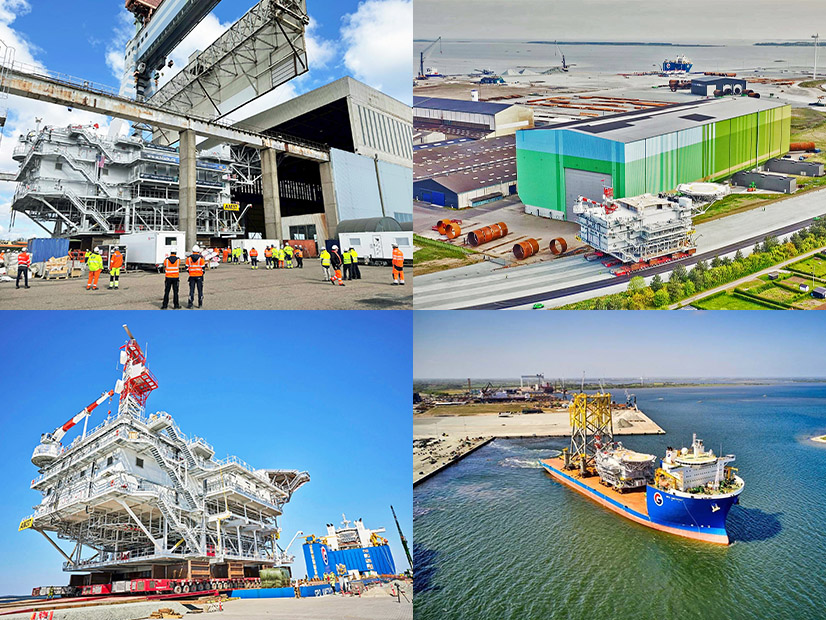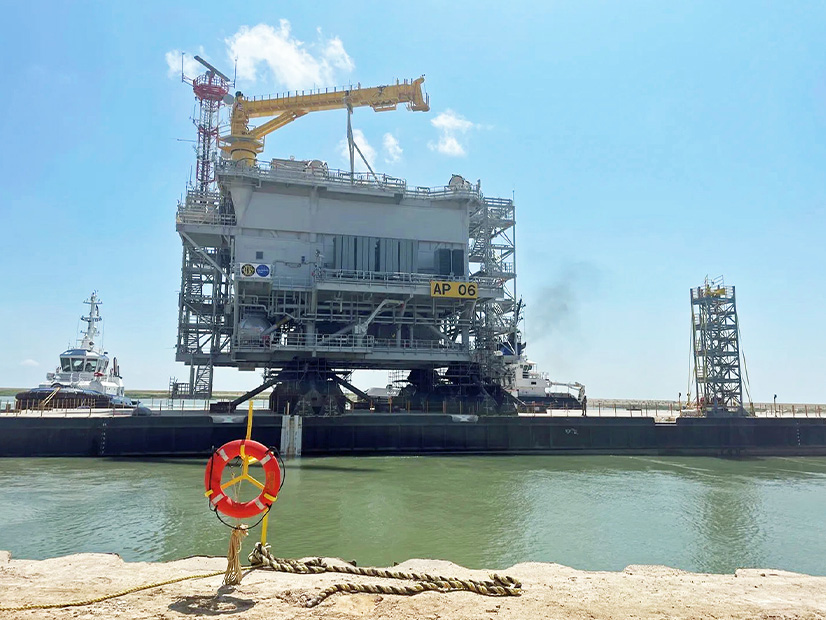
Transport ships set sail nearly simultaneously this week from Denmark and Texas to the New England coast, carrying the first substations to the first large-scale U.S. offshore wind projects.
A 1,500-ton substation built by Kiewit Offshore Services in Texas was loaded and departed Wednesday for the South Fork Wind project south of Rhode Island, which will feed up to 132 MW into the New York grid. It is the first U.S.-built offshore wind substation.
Meanwhile, Bladt Industries inched a 3,200-ton behemoth out of its production facility on the Denmark coast, down an access road and onto a waiting heavy-lift vessel (HLV). It set sail Wednesday for the Vineyard Wind 1 project off Massachusetts, which will feed up to 800 MW into the New England grid.
The Vineyard substation’s 2,000-ton, four-pile jacket foundation is making the journey as well, secured to the deck behind the substation.
South Fork and Vineyard both began construction last year and are expected to start generating power this year.
One of them will have the distinction of being the first utility-scale offshore wind farm to come online in U.S. waters, where the offshore wind sector now consists of seven turbines rated at a combined 42 MW.
Other nations have been building offshore wind farms for a third of a century, and installed capacity worldwide has surpassed 63 GW as the industry has matured. As a result, initial U.S. offshore wind development will rely to a significant degree on foreign equipment while a domestic supply chain is created and expanded.
Nascent Industry
For this reason, design and fabrication of the South Fork substation in the U.S. is a milestone, developers Ørsted and Eversource Energy said in a news release Thursday.
 The first U.S.-built offshore wind substation is prepared for transport Wednesday from Ingleside, Texas, to the South Fork Wind Project off the Rhode Island coast. | Ørsted and Eversource
The first U.S.-built offshore wind substation is prepared for transport Wednesday from Ingleside, Texas, to the South Fork Wind Project off the Rhode Island coast. | Ørsted and Eversource
“South Fork Wind continues to demonstrate the enormous power of offshore wind to create a new, American-based supply chain as we work to grow the clean energy industry here in the United States — spreading economic opportunity to workers and local communities across the nation,” said Mike Ausere, vice president of business development at Eversource.
Also in Texas, Dominion Energy is building the first U.S. wind turbine installation vessel, and Ørsted and Eversource will be the first to charter it after its expected completion next year.
The supply chain for this new class of U.S. ship spreads far and wide.
The Eco Edison, the first service-operations vessel being built in the U.S., is using components made in 34 states, according to Ørsted and Eversource, which will use it for their Revolution, South Fork and Sunrise wind projects. The 262-foot ship will be the home at sea for up to 60 offshore wind technicians, the first group of whom are being trained now by Ørsted, the Danish firm that is the world’s leading offshore wind developer.
Mature Industry
Denmark has become home to a mature offshore wind industry since the world’s first offshore wind farm went online there in 1991.
Among the companies in the sector is Bladt, which has produced more than 3,100 foundations and 25 substations. For the Vineyard project, it partnered with two other Danish firms, Semco Maritime and ISC Consulting Engineers: Bladt worked on steel manufacturing, Semco and ISC on design, and Semco on electrical installation.
Bladt said it and Semco have been targeting the new U.S. offshore market and secured seven of the first 11 substation contracts awarded in U.S. waters. When the substation and its foundation arrive at the installation site south of Martha’s Vineyard, Vineyard Wind contractors will install it, and then Semco and Bladt will work over the summer to commission it.
In a news release Thursday, Bladt Chief Project Officer Klaus Munck Rasmussen said, “Many years ago, we were a part of the first offshore wind projects in Denmark when the industry evolved here, and it feels great adding a new chapter to our story with our involvement in the first U.S. project.”
“Moving a 3,200-ton object is not something that we experience every day, so we have been excited to follow both load-out and sail-away from our side of the Atlantic,” Vineyard Wind CEO Klaus S. Moeller said. “With the components on their way, we look forward to welcoming the barge here in Massachusetts.”
Also Wednesday, a Portuguese-flagged HLV docked in New Bedford, Mass., bearing the first supersized components for the 62 towers that will be erected for Vineyard.
New Bedford years ago moved to make itself a shoreline hub for the wind industry envisioned off the New England coast.
There is a little irony in this: A fleet based in New Bedford helped hunt some whale species nearly to extinction, harvesting their oil for lamp light. Now construction crews will sail out of New Bedford to create a new source of electricity to light homes and businesses. They are strictly mandated to take a long list of precautions to not kill any whales in the process.
New Bedford Mayor Jon Mitchell on Thursday called the landmark delivery of tower components “poetic.”



